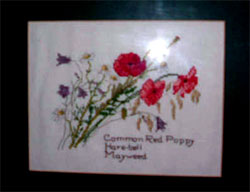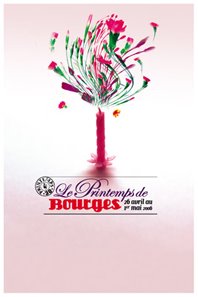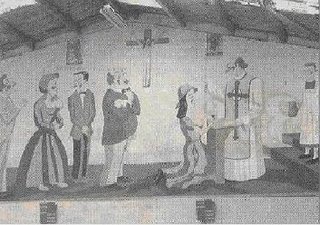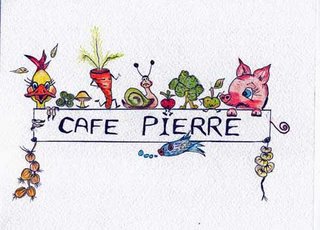Saturday, December 30, 2006
J-1 et ce sera la fin ... de l'année 2006!
Friday, December 15, 2006
Les francais ,'Strike' beaucoup??
Pierre
Joyeux Noel et bonne année!
All the best for Cristmas and New Year
Monday, December 11, 2006
Sunday, December 10, 2006
Accents in France.
Really, a French accent doesn’t exist in France but, rather a great deal of accents according to the different regions. We can consider there are two “families”:
- In the south just under the Limoges-Grenoble line, the accent is said to be the “accent du midi” (southern accent)
- Above this line, people from the south of France say “accent pointu” (northern French accent). I don’t know why!
Of course within these two families there are differences according to the place in these regions, the people who speak and if they live in a town or in the country.
The southern accent is a ‘sing-song accent’ where people say all the vowels in the words distinctly, often stressing them. This accent is more or less harsh if you are in certain areas and in the area of Narbonne, for example, a lot of people roll the rs. If you are not accustomed to this accent, it is difficult to understand, sometimes even for French people! Between Bordeaux and Marseille there are differences but it is almost the same way of speaking.
Above the line, people living in Alsace have a strong accent very close to the German accent. In the other areas there are differences. For example, we can recognise people living in the north of the Alps, Brittany, and in the area of Lille… Of course, in the country, accents are more stressed and sometimes melted into a provincial dialect.
In France, some people say that it is in the area of Tours that people have the best French accent (the purest accent). I don’t know why we say that! On the contrary, in the south of France people say they have the loveliest accent. I think it is a question of taste.
For a foreigner, the accents add difficulties to learning the language, but French people have the same difficulties with the English language! It would be interesting to have diction courses on both sides of the channel taking this data into account.
The different French accents tend to be softened probably because of TV where we don’t normally hear strong accents, the journalists and artists…mainly speak with the ‘Tours’ accent.
Claude
How the wine is produced
1. Red wine:
After picking red or black grapes (not white), the grains are crushed a little so that the juice can flow out naturally. In order to do this, the grapes are passed through two revolving, fluted rollers each spinning in the opposite direction. The grapes and the juice are then put in big, open barrels and stay there for around fifteen days allowing the mixture to ferment. (We sometimes say that it boils!) With the modern technique, the barrels are vats and the fermentation is temperature-controlled by adapted devices (cooling or heating). This sometimes makes the wine better.
Then, the grapes are removed from the big barrel and put into a wine press and all the juice is extracted. After that, the wine is put into smaller wooden barrels so as to allow the suspended particles to settle at the bottom and the wine to take on a little bit of the taste of wood (important parameter).
After some weeks the wine is removed from the top of the barrel, which allow the particles (we say sometimes the mud) to be removed. The wine is put back into the barrel and stays like this for a few months. Then the bottles are filled with this marvellous drink! And the best is to leave the wine in a cellar for a few years before drinking it.
In industrial processes, the wine is not put in barrels but stays in big vats before bottling. Sometimes, wood shavings are put in the vat to add a taste of wood. It is forbidden in France!
2. White wine:
In this case, after picking the white grapes, the grapes are directly pressed and only the juice is put in big barrels or vats so that fermentation takes place. After that, we find almost the same process as for the red wine.
3. Rosé wine:
The process is the same as white wine, but using red or black grapes.
Other processes exist for example for Champagne, sparkling wine, wine obtained with late grape-picking…but they are specific products.
Claude.
Friday, November 10, 2006
Inspector Barnaby from the other side of the channel.
I would say: it is so British.
Claude.
Brian's interests
I love classical music. I have a big collection of records and CDs, and I go to concerts two or three times a month. With a couple of friends, I also travel to places like Leeds, York, Newcastle and Scarborough to see plays, operas, ballet and art exhibitions.I read a great deal - novels, detective stories, poetry, non-fiction, in fact, anything I can get my hands on!
For exercise, I swim 800m. twice a week, but I am not a very good swimmer. I go for fairly long walks as often as I can, and there is always a lot of work to do in the garden.
I love languages, and as well as French I know some Spanish, Italian, and German, and a (very) little Russian.
Brian's thoughts about Big Brother!
Je ne suis pas à l’aise avec l’augmentation de la surveillance par les autorités, sauf pour la détection des crimes sérieux. Je crois que l’application de cette technologie pour reprocher tous ceux qui se comportent sans considération est l’utilisation d’une masse pour casser un noix, et un pas de trop le long d’un chemin dangereux. Sans la vie privée nous perdons nôtre liberté.
De plus, il faut nous souvenir que les surveillants ne sont qu’êtres humaines qui soient soumis à la tentation d’abuser l’information qu’ils obtiennent.
Thursday, November 09, 2006
Sue Carling's interests
 Dear Sylvia
Dear SylviaThank you for posting so many interesting articles on the blog. Peter has asked our class if we could write a few lines about our hobbies. Obviously, one of mine is learning French. I really enjoy meeting the other students as well as learning more about France and the French language. I also like gardening (but only when the sun shines – we call this ‘fair weather gardening’ round here). I also enjoy walking with friends in the countryside, or with my dog. I love books and reading – luckily I work in a library. If I get a quiet few moments to myself, I like to do cross-stitch embroidery; I am not very artistic, I can’t paint or knit or sew, so this is my only creative outlet!
Wednesday, November 08, 2006
And some more reaction!
Je pense que c’est triste que nous avons besoin des cameras de surveillance. Pour moi c’est une question avec deux opinions.
D’une part, je pense que si on ne fait jamais qu’est tort, on n’a rien à peur.
Mais, d’autre part, je m’inquiète que ces cameras peuvent suivre les mouvements de chaque individu.
Les gens qui font marcher ces cameras peuvent ramasser beaucoup d’information d’un individu. Sont ces gens dignes de confiance ?
And some more reaction
A mon avis c’est trop embarrassant pour les personnes et si on a utilisé fréquemment il deviendra une distraction aux personnes qui fait les courses.
Walter.
More reaction to the cameras!
Je m'appelle Susan. Je suis étudiant de Peter et je viens de lire votre extrait au sujet des appareils photo parlants de surveillance en Middlesbrough. Je suis tout à fait d'accord avec l'utilisation d'eux.
Je souhaite que nous en Angleterre n'ont pas laissé tomber les détritus. Les Français qui ont toujours le respect. Je crois que si on n'a fait rien tort puis on n'a rien de peur.
Wednesday, November 01, 2006
Quels sont vos loisirs?
Mais aussi à travers cette question nous établissons un premier contact sympathique et entre eux les étudiants apprennent aussi à se connaître et parfois ils se découvrent des passions communes.
Aujourd'hui je vous propose de découvrir à travers ces quelques photos les passions de Marie-Pierre et de Danielle qui ont décidé il y a deux ans d'apprendre l'anglais et doivent maintenant partager leurs temps de loisirs entre exercices d'anglais et activités artistiques.
PS: J'espère que le 'slide show' va bien fonctionner c'est mon premier essai!
Flea markets.
These “brocantes” take place at weekends often outside, in villages, towns and are in fashion in France. It is a way to attract people to places where there are usually not many inhabitants. Sometimes it is the great annual event of the village! In our Department (Cher), we have at least about a hundred brocantes a year…
The biggest “brocante” is the one in Lille in the north of France with thousands of dealers and hundreds of thousands of people interested in this market. Maybe English people know this event better than I do because it is just on the other side of the channel and the Pound is overvalued against the Euro!
You used to be able to find a lot of second-hand objects on these markets, called “objets dans leur jus” (objects in their juice) that means without restoration (furniture, tools, crockery, cameras, clothes….) and you could do good business.
Today, it is a bit different because you find dealers selling restored things that look like objects which are usually sold at an antique dealer’s. And you also find what we call “vide-grenier” (empty-attic?). In this case the objects are sold directly by inhabitants who sell everything at a very low price but sometimes I wonder who are interested in these items! Dealers are often children who sell their toys, their books, their bikes…and know how to bargain!
Alas, now we rarely get good bargains because there are less and less interesting things to be sold and so prices are increasing…
The negative side of these “brocantes” is that it is a way for dishonest dealers to sell stolen goods. In France we have many examples!
Claude.
Monday, October 16, 2006
Some reaction to the ,Cameras in Middlesbrough'.
Si une personne jette son détritus sur le trottoir, les autres gens devraient dire à lui de le mettre dans une poubelle. Mais les gens ont peur de la violence ou des insultes. Voilà, voilà, un voix de l’air.
Je crois que c’est une situation triste mais nécessaire. Les bouteilles cassées, le fast food dégoûtant, les mégots, tout ce détritus est dangereux et vilain. Ça manifeste un manque de respect pour les autres et pour soi-même.
Sue F5 Octobre 2006.
Tuesday, October 03, 2006
Les mois en « bre » changeons nos habitudes et mangeons des moules !
Le temps est humide et se rafraîchit nous avons envie de plats cuisinés bien chauds comme les lentilles, le bœuf aux carottes et la soupe de potiron. Si nous avons la chance d’habiter dans une région à champignons nous pourrons nous régaler d’une petite omelette aux cèpes ou aux girolles.
Et bien sûr le plat du mois (et des mois suivants) les moules marinières et leurs frites, c’est obligé on ne mange plus de moules sans frites ! Personnellement je fais rarement des moules « marinières » je préfère les accommoder d’une sauce poulette au bleu. La sauce poulette c’est la crème anglaise des moules ! C’est très simple à préparer il faut 2 jaunes d’œuf et 150g de crème fraîche. Battre les jaunes, y ajouter la crème et quelques cuillérées de jus de cuisson des moules (les ajouter une par une), ensuite il faut faire chauffer tout doucement en continuant de remuer, comme pour la crème anglaise il ne faut pas la faire bouillir, et voilà à table c’est prêt ! Hummmm c’est si bon !
Sylvia
Grape-picking in progress.
For two weeks, the grape-picking has been going on. Now the technique of picking the grape is not the same as it was before because the majority of wine growers (90%) use grape-picking machines. The result is that in the vineyards you can only see a few people (two or three people working the machine). Before there were “Armies” of people in the vineyards who cut the grapes, put them in baskets and after that in carts to carry the grapes to the cellars. A machine is able to replace around thirty people!
If the technique has changed, the result too. In the case of a machine, what is harvested are only the grains without the “stems”. The grapes are shaken with the means of two overlapped vibrating “combs” and the grains fall into chutes and are led into a tank located at the rear part of the machine.
When you make the wine (processes differ depending on the type of wine: white, red or rosé) the result is a bit different. The taste is not exactly the same. My opinion is that the wine is better: milder (it is only my opinion because wine growers who vintage in the traditional way say the opposite! Maybe it is for their business). Never mind both are very good!
This year the wine should be a “normal” year in quantity and quality.
Cheers!
Claude
Tuesday, September 19, 2006
English saying no. 1
Donnez votre explication à votre prof en anglais et trouvez la phrase française.
Pierre
Thursday, June 08, 2006
Kent loses its Garden of England title to North Yorkshire
Something that I have known all of my life!
North yorkshire is the '.Garden of England'
If , like me you have lived nearly all of your life in North Yorkshire, it's obvious!
Have a look at the following article.
North Yorkshire
Wednesday, June 07, 2006
If you pass through Sancerre this summer…
Well then, if you like music, come and find out for yourselves.
Claude, one of the Festival organisers.
Orchestre à cordes de La Garde Républicaine
Direction : Sébastien Billard
Orgue : François-Henri Houbart
Concerti pour orgue de C.P.E Bach - G.F.Haendel
Œuvres de Mozart, Britten, Respighi.
Samedi 8 juillet à 16h
Eglise Notre Dame de Sancerre
Feeling Brass Quintet: R.Leleu L.Sonrel S.Tuytten N.Moutier F.Marillier
Bach, Caccini, Joplin, Haendel…
Dimanche 30 juillet 2006 à 17h
Eglise Notre Dame de Sancerre
Récital de Piano Sergueï Markarov Artiste de l’Unesco pour la Paix
Haydn, Beethoven Schumann, Listz.
Dimanche 6 Août 2006 à 16h30
Eglise Notre Dame de Sancerre
L’Ensemble Zéphir: D.Riegel L.Presti L.Boutet L.Ramon T. deRitis R.Ward F.Bou
Fauré, de Ritis, Schubert, Brahms, de Falla, Rossini.…
Dimanche 13 août 2006 à 17 H
Eglise Notre Dame de Sancerre
Monday, May 29, 2006
Féminin ou masculin ?
Pourquoi « j’ai le moral quand le soleil brille » et pourquoi « la morale de l’histoire c’est que les hommes ne font pas la pluie et le beau temps », ou encore « tu ne vas pas me faire encore la morale, j'ai 30 ans je suis majeure! »?
Pourquoi dit-on « un bassin » et « une bassine » ? Au fond du jardin il y a un bassin, dans le bassin il y a des poissons, mais autrefois nous faisions notre toilette dans une bassine et heureusement il n’y avait pas de poissons car c’est bien connu une bassine c’est trop petit!
Dans le même genre c'est-à-dire les mots qui changent de genre afin de différencier les objets d’une même famille en fonction de leur taille, nous pouvons citer les exemples suivants donc du plus grand au plus petit :
un char, un chariot mais une charrette
un sac et une sacoche
un camion et une camionnette
un savon et une savonnette
Mais comme toutes les règles de la langue française n’existent que pour être transgressées il y a bien sûr des contre-exemples :
une fourche, une fourchette : les deux sont féminins et pourtant essayez de manger avec une fourche !
Maintenant si vous êtes curieux de savoir si Paris est féminin ou masculin, je vous recommande d’aller sur le site de TV5 et d’aller à la page web suivante :
http://www.tv5.org/TV5Site/lf/merci_professeur.php?id=2650
Sylvia
Le printemps de Bourges
Bonjour aujourd’hui nous allons vous parler du Printemps de Bourges.
Un festival de musique qui n’est pas toujours sous le signe du printemps et selon les caprices du ciel il y fait beau, il pleut ou il neige ! Toutes les conditions météo ont été testées en 30 ans.
o Que peut-on entendre durant ce festival ?
Ces dernières années il s’adresse plutôt aux jeunes et on peut entendre du hard rock, du RNB, Soul, reggae, rock’n’roll, techno pop, et de la variété française. L’image de ce festival contraste totalement avec l’image de la ville bourgeoise habituelle.
o Pourquoi est-ce un évènement ?
Premièrement parce que depuis 2 ans Canal+ réalise une émission journalière en direct de Bourges. Deuxièmement cela attire à peu près 50 000 spectateurs dans les salles sur les 5 jours de spectacle. La majorité vient de la région et de toute la France. Troisièmement cela représente dans les rues à peu près 200 000 personnes !
Pour une ville de 70 000 habitants c’est une opération de promotion très importante, enfin on parle de Bourges dans les média nationaux ! Et on en a grand besoin pour se sortir de l’image vieillotte de la ville. Certains l’appelaient et l’appellent encore « La Belle au bois dormant ».
o Et les artistes qu’espèrent-ils en venant ici ?
Beaucoup en attendent une consécration, d’autres un tremplin pour atteindre une renommée nationale. L’origine du Printemps de Bourges comme son nom le suggère est une scène où l’on découvre de jeunes talents. Des artistes étrangers aussi viennent à Bourges et notamment des groupes britanniques.
Maintenant si vous n’avez pas peur de prendre des décibels plein les oreilles et si vous aimez les surprises, venez au prochain Printemps !
Sylvia et Claude.
Wednesday, May 17, 2006
French Class 5
Chére Marie,
Je voudrais que tu peux me rendre visite au mois de Septembre. C’est le commencement d’automne qui d’habitude est une saison très agréable quand les journées sont longues avec beaucoup de chaleur, mais il ne fait pas trop chaud. En Septembre passée il ne pleuvait guére, les vents étaient faibles et les journées ensoleillées. J’espère que cette année Septembre soit pareil – un mois splendide pour visiter des chateaux de Nothumberland et Yorkshire sans trop de monde, et pour faire des randonnées sur les landes et la longue de la côte. Mais attention! On ne pourra pas nager dans la Mer du Nord qui est toujours froide même en hivers. Aussi la temperature baisserait peut-être le soir, et il te faudra apporter un pull et un anorak. Tu auras besoin de chaussures de marche aussi. Donnes-moi un coup de telephone pour m’aviser des dates possible – je compte sur toi pour venir chez moi.
Bonne Santé st Bises, Marian
Ou Nous Habitons
~ Une Histoire Courte
La ville de Middlesbrough, ou nous allons pour nos leçons de Francais, est aujourdhui au centre d’une grande agglomération, qui s’appelle Teesside. Middlesbrough est situé sur la rive Sud du fleuve Tees. A l’Est, la ville de Redcar est à l’embouchure du Tees, et à l’ouest, plus à l’intérieur, il y a Stockton. À travers le fleuve, il y a Billingham avec Hartlepool à la côte. Chacune de ces villes a sa propre histoire et sa propre identité.
Separé de cet groupe de villes a une distance de 13km est Darlington. Au commencement du dix-neuvieme siècle il y avait des grandes et très riches bassins houillers autours de Darlington. En fait, ils étaient les plus grands d’Angleterre à ce temps. En 1810, Stockton a été aménagé comme port maritime, et la plupart du charbon était envoyé par bateau le longue du côte de la mer du Nord à Londres. Toutefois, les quantités de charbon qu’ils ont du transporter augmentaient, et ils en avaient besoin d’un chemin de fer de Darlington à Stockton. Ils pensaient avoir des wagons tirés par des cheveux.
L’ingénieur bien connu, George Stevenson, avait travaillé à des machines à vapeur dans les houillères. Il a entendu de cet projet et il croyait qu’il doit etre possible de construire un machine à vapeur monté sur des roues. Ainsi, il dit aux propriétaires des bassins houillers, qu’un machine à vapeur pouvait tirer cinquant fois plus qu’un cheval. Alors, le chemin de fer fameux, Darlington à Stockton, a été construit. C’était le premier chemin de fer du monde entier qui utilisait des locomotives à vapeur pour transporter du fret et des voyageurs.
En 1825, le premier locomotive est allé de Darlington à Stockton et en avance il y a eu un homme montant sur un cheval et portant un drapeau. Le message sur le drapeau a dit en Latin qu’il peut être dangereuse mais c’est pour le bien du public. C’est probable que personne n’a pu comprendre le Latin ! Plus tard, après le cavalier était parti, Stevenson est monté à 24km par heure en tirent des wagons portant 450 voyageurs. En 1830, on a decidé que c’est necessaire d’avoir un nouveau port plus près de l’embouchure du fleuve. Le chemin de fer a été étendu à un nouveau port et Middlesbrough a été né.
Stockton n’est plus un port maritime et le chemin de fer est seulment une ligne secondaire de la grande ligne de Londres à Edimbourg qui va en passant par Darlington. Aujourd’hui, il y a le barrage de Tees entre Middlebrough et Stockton, et Stockton est devenu une marina. A côté de cet barrage il y a un cours d’eau vive ou on peut faire du canoë-kayak.
En plus, deux ponts à Middlesbrough empêchent maintenant des bateaux grands d’aller plus loin en amont à Stockton. Un pont est pour l’autoroute et l’autre est le vieux pont à l’ascenseur qui est en bas en permanence. Middlesbrough a un autre pont en aval, et c’est possible que maintenant c’est le seul pont de son type dans le monde. Il y avait trois ponts de ce type une fois en Angleterre. En Anglais, nous l’appellons ‘a transporter bridge’. Il consiste d’une construction en acier assez haut pour permettre tous bateaux à passer en dessous. Une plate-forme pour porter les voitures est suspendu de cette construction et peut voyager d’un côté du fleuve à l’autre.
Aujourd’hui, Middlesbrough a presque le même population que Stockton, et la population de Teesside entier est envers d’un demi-million. Il y a des grandes usines pour la production d’acier et des produits chimiques et pétrochimiques. Le complexe chimique à Wilton peut est le plus grand en Europe. Cependant, il y a de beaux paysages par ici. Nous avons les landes du Parc National de Yorkshire au sud, et à l’ouest il y a ‘La Campagne des Vallées’. Et aussi, les natifs sont amicaux !
Colin McGregor
LE PETIT PRINCE
C’est un livre charmant pour les enfants, peut-être, mais il contient les leçons pour les grandes personnes. L’auteur commence son histoire avec un souvenir de son enfance. A mon avis, il insinue ici que nous devons lire son histoire avec les yeux lucides d’enfant, car ‘les grandes personnes ne comprennent jamais rien toutes seules’. Il crée deux dessins, mais les grandes personnes ne peuvent pas voir la verité du sujet. Egalement, les grandes personnes qui recontrent le petit prince ne voient pas la chose la plus importante de la vie, dont le prince cherche. Ces hommes représentent le monde des adultes. Ils pensent seulement de l’argent, de l’autorité, les faits et les chiffres. Ils n’aident pas le petit prince de comprendre la rose, son amour. ‘Mais, bien sûr, nous qui comprenons la vie, nous nous moquons bien les numéros!’
Le petit price apprend le secret de la vie – ‘il faut chercher avec le cœur …l’essentiel est invisible pour les yeux’ d’un renard dans le desert. Le renard lui dit ‘Les hommes ont oublié cette verité’. Heureusement, l’homme dernier l’auteur, il écoute les mots du prince et du renard. D’abord, il ne les comprend pas…’Mais moi, malheureusement, je ne sais pas voir les mouton à travers les caises Je suis peut-être un peu commes les grandes personnes. Je dû vieillir’. Mais quand le petit prince est revenu à son étoile, l’auteur se rend compte l’essentiel. S’il est triste, il sait que ‘On risqué de pleurer si l’on s’est laissé apprivoiser….’
J’aime cette livre - il tient des pensées intéressantes, mais je crois qu’il importante qu’on le lit en anglais ou en français dans un session – on peut le mieux comprendre le moral de cette fable.
Monday, May 15, 2006
Tony Blair in our local paper.

This article was published in our local newspaper. Claude wrote a little comment making a pun, how would you translate this pun?
I’m sure you have lots of pun words and expressions that appear in your press to comment on your Prime Minister. Please tell us.
In this article they mention a «cruise», if you remember one of our post in March in a French article they also mentioned a cruise talking about Chirac and the Clemenceau. Very strange, isn’t it?
Sylvia
Poor Dogs and mad people.
The point is not the so-call music but as always: drug. Before the show, an impressive quantity of drugs was found by the police forces. But everybody knows that many people come to these places to take drugs.
The problem for the dealers is: how to bring drugs up in the place?
Mad people have found the technique. They force their dogs to swallow drug put inside plastic bags. So, they can enter the enclosure safely. So as to retrieve their drug they kill their dogs and disembowel them!!! After that, they bury their bodies!
One said in Bourges that for the Tecknival many bodies have been found (between fifteen and forty!! according to TVs, newspapers or so-call witnesses: but where is the true). The prefect has denied it….
It is a shame!
Result of the operation: eighty thousand people attend the teknival and one dead person from overdose… and the French Government has paid one hundred thousand Euros (at least!).
Saturday, May 13, 2006
The Spring of Bourges (Le Printemps de Bourges)

As each year for thirty years, a festival is organised in Bourges. It is a music festival. The theme is Rock and Roll and all the derivatives: hard rock, reggae…and so on. In reality, there are three festivals:
- the one taking place in auditoriums and under a huge marquee with admission charges. In the marquee, not everybody can sit and many people are standing… for the same price! The artists are well known by young people and arouse their enthusiasm
- the second is defined as open stages. These open stages take place outside in different places. They are free shows. The artists are often amateurs and come to Bourges to try to be spotted by production director.
- the third can be named the Pub Festival, because the artists play inside pubs and the spectators have to drink which is sometimes impossible in these jam-packed pubs. This year there are twenty-five places like that.
There is a common point between the different parts of the festival: the number of decibels, which is poured into your ears! Sometimes it is unbearable and I think it is a plant to make deaf people!
From an artistic point of view, you can find everything. It could be very good or it could be horrible and be defined only as… noise. I remember a few years ago, I was with Swedish people and we passed by an open stage and there was a violinist playing something and one of Swedish people asked me: who is killing the cat!
During the festival, the streets in the old town are crowded with people strolling and drinking at the same time! They go from open stages to pubs, buying food, sweets even clothes at itinerant dealers. It looks more like as a trade show than a festival!
Young people often sleep (but the nights are short!) in tents wherever there is a little bit of grass or in their cars or where they can (entrance hall of buildings, outside in a sleeping bag…). Waking is often difficult…and the festival-goers are recognizable by their look.
In the morning, the secondary effects are visible because a lot of rubbish litter the streets like on a battlefield and the town hall employees are on the go so as to try to clean the town up.
After five days of festival, the town has found its calm and its tidiness again!
Claude.
Friday, May 12, 2006
Café Pierre
Une lettre et le temps en Angleterre
Chère Denise
Je voudrais t'inviter chez moi pour passer une semaine de vacances, mais j'hésite à le faire à cause de l'incertitude du temps ici dans le nord-est de l'Angleterre.
Le paysage est très joli au printemps et quelquefois le temps fait assez beau. Les températures peuvent être très agréables sous un ciel dégagé. De l'autre côté, il y aura la possibilité, même la probabilité, que tous les jours soient pluvieux, qu'il fasse très froid en raison du vent fort venant du nord, et ce n'est pas rare d'avoir de la neige au printemps ici.
Quant à l'été, le temps est souvent aussi incertain qu'au printemps. Quelquefois il y a des journées ensoleillées et il fait chaud, mais on ne sait pas en avance lesquelles. Un jour c'est peut-être la canicule, le jour suivant les températures baissent et on frissonne! Si on aura quelques jours ensoleillés de suite, on aura bientôt des orages avec de l'éclairage, du tonnerre et de très fortes averses. Plus souvent le ciel est nuageux, les températures sont fraîches et il pleut. Toi, tu habites dans le Midi. Pourquoi aurais-tu envie de laisser le soleil éclatant et le ciel bleu garanti pour une semaine dans le nord-est de l'Angleterre où le temps peut être inclément, à moins que tu veuilles échapper de la canicule?
En automne ici il ya trop de vent et trop de pluie, et en hiver il fait trop froid. On peut avoir de la neige, du verglas et de temps en temps du brouillard givrant.
Je ne sais pas ce qui soit la meilleure période pour ta visite chez moi. Mais je viens de trouver la solution parfaite. Au lieu de cela, moi, je te rendrai visite dans le Midi en été. Après tout, j'adore la chaleur.
Meilleures amitiés et à bientôt
Pat
French 5
Monday, April 10, 2006
Monday, April 03, 2006
Football In Roma!
The events which took place in Roma remind me of the Roman Empire and its circus games in the arenas. The difference is that the show today is outside the arena with the same ‘tools’ to fight people! The legion is also there but only to watch people kill each other. In 2000 years, our civilization has not gone forward and the behaviours remain the same. How can we settle the problem? Maybe in abolishing sports! Was it not for the same reason that the circus games disappeared after the Roman Empire?
Bravo for your team and good luck for the continuation.
Claude.
Wednesday, March 29, 2006
Welcome to our club!
Claude
Tuesday, March 28, 2006
Boro v Roma

Nous sommes très fiers de notre équipe de football, Middlesbrough FC, qui a gagné le quart de finale de la coupe UEFA.
Mercredi, le 15 mars, nous sommes allés a Rome pour jouer contre Roma FC. Trois milles cinq cents supporters ont suivi l’équipe. Ils se sont bien amusés parmi les attractions touristiques de Rome par beau temps.
Malheureusement la police romane a gâté l’occasion par traitant les supporters comme des animaux. On nous a rassemblé en troupeau sur les cars, entassés commes des sardines. On a fouillé nos affaires et confisqué nos effets personnels. Après le fin du match, nous avons été retenus jusqu’à une heure et demie du matin.
Beaucoup plus gravement, une bande de supporters de Roma, appellée Les Ultras, a attaqué les supporters de Boro avec des couteaux, des haches et des massues, amenant aux blessures serieuses. On dit que la police savait tout au sujet de cette violence organisée, et qu’on n’a fait rien à l arrêter.
Biens des gens ont écrit des letters de plainte aux journaux, aux politiciens et à la police, demandant que UEFA examine la situation.
Carole Narey
March 2006
Monday, March 27, 2006
Sunday, March 26, 2006
A link with Edith Piaf
Flossie Malavialle.
The evening was to raise money for our town twinning association GATA
After the event, I received a call from an old friend and a member of the association, who told me the following story.
Edith Piaf's great love of her life was a French boxer called, Marcel Cerdan

He had 123 fights with 61 knockouts and lost only4. On the first of September 1939, he came up against a tough English boxer called Harry Craster and was disqualified in the fifth round in the Albert Hall in London.
Harry Craster was a Middlesbrough boxer and my friend told me that he used to spar with him in the latter stages of Harry's career.
Sometimes France doesn't seem so far away!!!!!!!
Pierre
Friday, March 24, 2006
Blasphemy
The painter painted the following fresco (which measures several metres):
 (Photograph scanned from a newspaper (not very good definition - in colour, it would be better)
(Photograph scanned from a newspaper (not very good definition - in colour, it would be better)The characters have a rather red coloured complexion, including the priest and the altar boy! The woman who is kneeling down is rather provocative with a very low-cut dress in front of a chalice. The priest is blessing the woman.
But what had happened?
The parish priest of Saint Amand vigorously protested against the organizers because to him it is blasphemy to represent a woman in front of a chalice with characters who seem to be inebriated! A heated argument ensued between the organizers, the clergy, the local politicians, the newspapers, the believers, the atheists…
Finally, the organisers asked the painter to modify his fresco… but he refused …So as to solve the problem, for the sake of peace, the organizers have hidden the right part of the fresco with paper. Only the four characters on the left remain!!!
This reminds me of recent fact…Is it an arrangement or a censorship? Everybody can think what he or she likes.
Claude.
Articles wanted!!
Hello we need you recipes and your poetry.
Send any articles to Pierre at;
midetraining@hotmail.com
Aussi , si vous avez des idées concernant votre Blog, dites nous!
Also, if you have any ideas regarding your Blog, tell us.
Pierre
Tuesday, March 21, 2006
Learners' Blog

Follow the link below to access your very own Blog. Have a look at Gordon's mouthwatering recipe for Cous Cous!
LEARNERS BLOG
Peter and Sylvia will be in touch with information about accessing your Blog.
Pierre
Wednesday, March 15, 2006
Employment or environment?

The ghost ships of Hartlepool,
“Polluted Teesside is the last place in Britain a new UK ship-breaking industry should be created”, say green campaigners.
Green groups objected to Able UK's multi-million pound contract to do the work saying America had a moral obligation to deal with its own waste and claiming the project posed an eco-risk to Teesside.
It was in November 2003 that the first ghost ship arrived from the USA.
The argument goes on, ‘Environment or Employment? In the meantime, the ships rot!
Sunday, March 12, 2006
L'hiver est arrivé !
Bourges Sancerre Hike (55th time).
This year, there were around 1500 people taking part in the hike who live sometimes far from Bourges (a few foreigners too). People walk in tracks sometimes through vineyards but the landscape cannot be admired before seven A.M! The weather was rainy and the tracks muddy which is not very pleasant. But people come only as a challenge for themselves. The only aim is… to arrive. The first arrive around 5 A.M and the last around 5 P.M or more! You can find tfifteen-year-old teenagers or elders of eighty years old! It is a melting-pot as we say in… French. Some people have already done this hike thirty times!! They must be very fond of it!
People arrived soaked in Sancerre. They looked like ‘soaked dogs’ (French expression).
And you have to pay to take part! We are a little mad in Berry.
Claude.
Friday, March 10, 2006
Gobsmacked!
Merci mille fois pour vos articles et podcasts, ils sont plus que superb, mega superb!!
Thanks for the brilliant poetry and we love the podcasting, Sylvia and I will show you all how to make your own soon, also we will have a new 'Blog' where everybody can participate.
Watch this apace for some articles from your English cousins,[ sorry Colin and Scottish].
Pierre
Wednesday, March 08, 2006
Journée de la femme: podcastons mesdames!
Vous nous reprochez souvent d'être bavardes et d'alourdir les notes de téléphone et bien maintenant nous podcastons...
Si vous voulez savoir comment nous podcastons et de quoi nous podcastons je vous invite à suivre le lien et à déchiffrer le message qui suit. http://sylvia1406.podomatic.com/
Bonjour, c’est sur un air de tango interprété par un trio de bassoniste, le bassoniste est le joueur de basson, nom français de l’instrument allemand appelé faggot que vous connaissez certainement, donc c’est sur cette musique que je vous invite à jouer avec les mots et les expressions familières de la langue française.…
Imaginons donc quelques expressions bien françaises qui se rapportent au fait de dire, de parler, de raconter ; et imaginons que nous utilisions le verbe « podcaster » qui d’ailleurs n’a pas encore fait son entrée à l’Académie Française qui comme chacun sait depuis 1635 veille sur la langue française et sur son évolution.
Oublions l’Académie et amusons-nous !
Par exemple, si je dis :
- Allez Pierre t’as bien l’temps de podcaster une bavette avec les copains !
- J’vais t’en podcaster une bien bonne !
- La pauvre Ginette n’a plus sa tête elle podcaste, elle podcaste.
- Tu sais ton fils, et bien il m’en a encore podcasté des vertes et des pas mûres, s’il croit que je vais podcaster ça !
- Mais que me podcastez-vous là ?
Voilà fin de la démonstration, maintenant à vous de me dire quels verbes de la langue française ont été substitués par ce terme d’origine anglo-saxonne (ah ! ces anglais que ne me font-ils pas faire encore !) Les connaissez-vous ? J’attends vos suggestions.
A la prochaine !
La grippe aviaire ...
 Faut-il en rire ou en pleurer,
Faut-il en rire ou en pleurer,Faut-il en manger ou ne pas en manger?
Tant de questions! Tant d'images aussi! En voici certaines, des dessins humoristiques car après tout je pense que le rire vaut mieux que des lamentations.
 En argot français le mot "poule" désigne une jeune femme, une petite amie et même donc une femme de moeurs légère, une prostituée. On peut entendre donc des "viens ma poule!" ou "ça va ma poule?".
En argot français le mot "poule" désigne une jeune femme, une petite amie et même donc une femme de moeurs légère, une prostituée. On peut entendre donc des "viens ma poule!" ou "ça va ma poule?".
La semaine des poètes.
http://sylvia1406.podomatic.com/
Je ne suis pas poète …
Mais à cause de vos chapeaux
J’ai envie de vous dire quelques mots.
Canotier, feutre, melon ou borsalino
Vous évoquez Mitterand ou Hugo.
De lavis en sépia
D’épure en gravure
Nous avons parlé peinture
Mais jamais de littérature
Préoccupé par vos postaux
Et moi par vos chapeaux.
Françoise Roblet 28/10/88.
Un acrostiche à partir du prénom "F-R-A-N-C-O-I-S-E"
FRANCOISE
Fasse le ciel de te voir
Rire et rire encore.
A ton coeur mets l'espoir,
N'oublie pas : l'aurore,
Cà ou là, nous attend.
Oisive ou débordée,
Instable ou sûre de toi, Sache toujours aimer,
Et qu'on t'aime longtemps.
A bientôt avec d'autres poèmes.
Thursday, March 02, 2006
Monday, February 27, 2006
Mon Grand-père m’a dit
le monde des adultes sera le profondeur de la tristesse,
le monde oublie et vieillit sans sagesse,
Mon Grand-père m’a dit,…
La nature perdra son souffle et sa beauté,
La nature perdra ses animaux et ses oiseaux,
Mon cœur sera une source d’eau aux larmes du chagrin,
Grand-père m’a dit,….
Le silence de la nature n’existera plus,
La sirène de mon village n’apparaîtra plus,
Les sinceres ne seront plus ecoutes,
Grand-pere m’a dit,
Mon cœur sera blessé,
Mon génie sera ignoré,
Ma bonté sera écrasée
Grand-père m’a dit,…. »
Tresor
Tuesday, February 21, 2006
Clémenceau
Vous nous connaissez par les articles écrits du blog, aujourd’hui vous allez entendre notre voix sur ce premier Podcast en direct de Bourges.
Nous allons vous parler d’un sujet d’actualité qui fait de nous la risée du monde entier …. Le Clémenceau.
Vous avez certainement entendu parler de l’horrible bête ! Qui hante les mers et océans du globe ! Il aurait pu faire le bonheur de milliers de travailleurs indiens si une réglementation européenne et internationale n’en avait pas décidé autrement et si Greenpeace et les « Verts » ne s’en étaient pas mêlés.
Quel est donc le problème ? L’AMIANTE. … que l’on retrouve sur beaucoup de toits de maisons de particuliers en France, dans de nombreux bâtiments publics, usines etc. mais on vous dira « ce n’est pas un problème ! » Les effets de l’amiante sont connus depuis les années 50 et l’on se réveille 50 ans après… Nos politiciens nous ont-ils caché quelque chose ? Sommes-nous en danger, Claude ?
Dans certains cas OUI. Pour en revenir à notre bateau oui c’est dangereux car en le « désamiantant » on crée de la poussière d’amiante qui elle est cancérigène.
Voyons plus précisément la croisière du Clémenceau, et ce n’est peut-être pas la « Dère des dères » !
Première étape sous le soleil d’Espagne car après tout il est plus agréable de se déshabiller au soleil même pour un porte-avion habillé d’amiante, mais les espagnols qui tiennent à leurs plages avaient en fait sous-traité le déshabillage aux Turcs...
Mais il n’a pas vu les côtes espagnoles ni les côtes Turcs à cause des « Verts » et de l’Europe. Retour en France : Toulon pour un léger déshabillage.
Puis départ pour la grande aventure en Inde avec passage difficile et coûteux par le canal de Suez ! Après action de Greenpeace et des « Verts » et juste avant le voyage de notre Président Chirac en Inde la décision de retour a été prise pour accoster près des côtes anglaises à Brest ! Qui ne veut pas du bébé pour des raisons écologiques.
Quel sera le prochain épisode ? Peut-être pourrait-on le vendre à une société anglaise qui a déjà acquis 4 navires de guerre américains hors d’usage ?
Nous aussi à Bourges nous avons un problème Clémenceau qu’il nous faudrait traiter avant 50 ans…
Ce n’est pas un navire en perdition mais un lieu de perdition, une boîte de nuit, une discothèque plus ou moins bien fréquentée.
Le bâtiment étant une ancienne imprimerie il y renferme très certainement dans ses plafonds de l’AMIANTE ! et ceci sans parler des fumées de tabacs et autres produits NATURELS …
Notre Clémenceau ne partira pas en croisière pour se purifier. Nous serons obligés de le traiter nous-mêmes par nos propres moyens.
Nous avons parlé du Clémenceau et non de Clémenceau, homme politique français surnommé le Tigre qui négocia le Traité de Versailles et déclara en 1918 à propos de la Première Guerre Mondiale « C’est la Dère des Dères ! » Visionnaire monsieur Clémenceau.
Dère : contraction de dernière ce devait être la dernière guerre mondiale !!
Désamiantage : nouveau mot de la langue française signifiant « enlever l’amiante ».
Merci à tous, ce n’est pas la dère des dères !
Monday, February 20, 2006
Response to Claude's article
If the 'natives' don't speak English, what do we do?
We shout! Well, I'm saying we, but I am embarressed to say that there are a hell of a lot of Brits who do just that.
I want to go to Spain this year, as I have been trying to learn a little Spanish. But I am afraid that when I get there it will be the usual;
Noisy bars full of drunken Brits, expecting everybody to understand their language, with very little respect for anybody or anything! And the worst thing for me is the ignorance when expecting 'English food', well roughly described as English, Burgers, chips and fried rubbish.
They don't know what they are missing , they should join our language classes!!!!!
Pierre
"Courchevelshire"
I spent a week in a skiing resort (Courchevel) in the Alps which consists of four levels of villages (altitude: 1300 m, 1550m, 1650m, 1850m). The landscape is marvellous but the price of everything is in relation to the altitude!
I arrived in Courchevel 1650 in a flat in a big chalet. On the shelves, I found a lot of books in… English. It was normal the owner is an Englishman. The equipment often comes from England too!
The next day, I went to a crowded shop to rent some skiing equipment: surprise! everybody was speaking English (manager, assistants and customers). I was the only French person! The manager came and spoke to me in… French (whew!).
After that, I went to the ski runs. There were groups of people with French instructors: everybody speaking in… English. But where was I? : on the other side of the channel…
No, the signs are also in French!
At the end of the afternoon, I went shopping where people were speaking mainly in English including the shop assistants (or at least trying to) and passed by a few pubs: English people were numerous and the beer was flowing (coulait à flot in French). People were speaking noisily and drinking out of large glasses (one litre maybe). I didn’t see the exit from the pub of these people but their trajectory would have to be a slalom…(normal in the mountains!). I am not against pubs but I drank at home as it is more prudent than walking in the snowed-up streets.
I learned that there is a big problem between French instructors and English instructors managing a group of English people. They don’t have the same level of training (not at all the same diploma) or the same knowledge of the mountains. You can be sure the real problem is a problem of… money!
Courchevel 1850 is another, more cosmopolitan planet: Russian, Japanese, Chinese, French and… English people of course. It is a posh place where you can find great hotels, marvellous chalets, luxury goods shops, art exhibitions. You can attend concerts, ice skating shows and so on.
It is the place where you have to be seen and I saw more “Ladies” wearing mink coats and men in superb 4X4 cars (Porsh, Merc., BMW, Range Rover…) per ‘square metre’! Here it is not beer which is flowing…but money!
At this period of the year, around 70% of the people Courchevel 1650 welcomes are English. Fortunately for the trade!
Claude.
Thursday, February 16, 2006
A popular French joke

You, English folks, you had the whale in the Thames river in January. We, French, we have a very popular joke : "The sardine obstructing the seaport of Marseille".
Françoise
English 1B
IMEP
If you want to know more about this story, because it was a true story that happened in the 18th century follow the link below.
http://www.marseillais-du-monde.org/sardine.php3
Sunday, February 12, 2006
The Tour de France 2007
Click the link above to listen to Gordon.
http://cafepierre.wikispaces.com/
Click on the link above to comment on the podcast
The Tour de France 2007
Imagine my delight to read in the French press that London has been chosen to host the start of the Tour de France in July 2007. The prologue* will be contested on 7 July with the race making its real start the following day. The route of the stage isn’t yet known but the riders will make they way in front of Buckingham Palace, Trafalgar Square and the Houses of Parliament at Westminster.
I am a keen cyclist and I have followed the Tour since I was a lad. There have in fact been two visits to England, in 1974 (returning by ferry) then in 1994 using the newly constructed channel tunnel. A British cyclist, David Millar – a Scot, will have a good chance to win the prologue and the yellow jersey – I hope!
Long live the centenary of the Entente cordial between France and the UK. Is it possible for a Frenchman to win the Tour this year? – Sadly I think NOT.
The prologue* is a short stage against the clock.
Gordon Bailey
French 5
Middlesbrough
6 February 2006
Thursday, February 02, 2006
Journey South
Also, Peter tells you about his possible journey south.
Link below.
http://cafepierre.podomatic.com/
The town of Middlesbrough and its surrounding area has a lot to be proud of but it is not particularly well known throughout Britain. Therefore, when the opportunity arises to “sing our own praise”, we make sure that we do!
Two brothers from our town recently entered a national talent show in a bid to become pop stars. The competition took place over many weeks and they had to endure plenty of criticism as well as praise from the judges. The whole town seemed to get behind them. Even if you didn’t watch the show you couldn’t escape their progress because everyone was talking about it! Children discussed it at school, there were posters in local shops and the radio station was interviewing their parents on a weekly basis!
Unfortunately, they didn’t win the show. However, they have still been given a recording contract – so, listen out for the name “Journey South” and remember where they come from!
Helen French 5
Saturday, January 21, 2006
A farmer's Boy
The sun had set behind yon hill across the dreary moor,
When weary and lame a boy there came up to a farmer’s door.
Can you tell me where ever there be one that will me employ-
To plough and sow, to reap and mow, and be a farmers boy,
And be a farmer’s boy.
My father’s dead, my mother is left with five children large and small,
And what is worse for my mother still I’m the biggest of them all.
Tho’ little I am I would labour hard if I could get employ –
To plough and sow, to reap and mow, and be a farmer’s boy,
And be a farmer’s boy.
And if that you no boy do want, one favour I’ve to ask
If you’ll shelter me till break of day from this cold winter’s blast,
At the break of day I will haste away elsewhere to seek employ—
To plough and sow, to reap and mow, and be a farmer’s boy,
And be a farmer’s boy.
The farmer’s wife cried “try the lad, let him no longer seek”,
“Yes father do”, the daughter cried, while the tears roll’d down her cheek.
“For those who would work it’s hard to want and wander for employ,
Don’t let him go, but let him stay and be a farmer’s boy,
And be a farmer’s boy.
The farmer’s boy grew up a man, and the good old couple died,
They left the lad the farm they had, and the daughter for his bride,
Now the lad which was and the farm now has, often thinks and smiles with joy,
And bless the lucky day he came that way,
To be a farmer’s boy,
To be a farmer’s boy.
A podcast will soon be available with the spoken word for this poem.
Peter
Podcast
http://cafepierre.podomatic.com/.
If it works, watch this space!!!!
Peter
Thursday, January 19, 2006
A test
http://www.cafepierre.co.uk
Merci bien Claude.
Friday, January 06, 2006
Un peu de la poitique!
At the beginning of each New Year, the tradition is the Season’s Greetings on behalf of important people in the town. The Major of Bourges, the President of the “Conseil Général” and the Prefect invite certain people in different places and offer their wishes for the coming year. It is a place where one must be seen... Though they wish the best for everybody, their topics are of another matter. They have “something else behind the head” (French translation; ulterior motive in English). They speak politics! What they did best in the previous year, what they will have to do in the next year and so on… They make promises (for our well-being)… Promises are always free in France and only commit the people who are listening! Their real purpose is to flatter people and so to try and attract people to vote for them in the next election…
People attending the show listen to them piously and wait motionless until the end of the speech to hurry to… the buffet so as to drink wine… and eat “petits fours”. It is a real scrum because there is a big crowd present, the space is lacking, the buffet often too small….It is difficult to meet people and conversations are difficult and often trivial in this hubbub.
For the most, at the end people leave happy!!
It is just my opinion (but I am disrespectful).
No Claude I disagree, you are just being truthful .
Peter
Wednesday, January 04, 2006
Confused ? You will be!!
Sleon une édtue de l'Uvinertisé de Cmabrigde, l'odrre des ltteers >dnas un mot n'a pas d'ipmrotncae, la suele coshe ipmrotnate est que la >pmeirère et la drenèire soeint à la bnnoe pclae. Le rsete puet êrte dans >un dsérorde ttoal et vuos puoevz tujoruos lrie snas porlbème. C'est prace >que le creaveu hmauin ne lit pas chuaqe ltetre elle-mmêe, mias le mot cmome >un tuot.> La peruve...> Arlos ne veenz puls m'ememdrer aevc les corerticons >otrahhgropqiues.>
Merci Claude, ppehras we cloud try tihs einprmeext in Elsginh?









